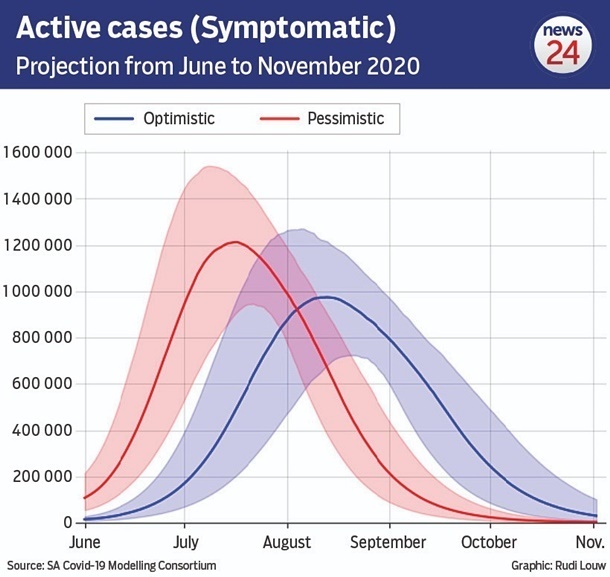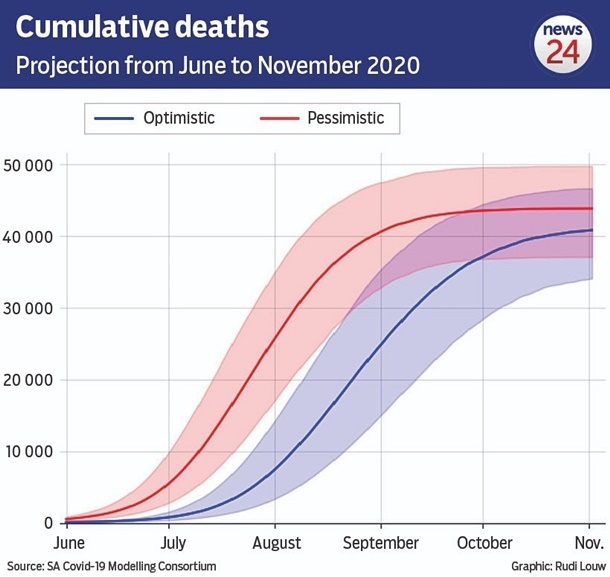South Africa
#CoronavirusSA’s projections a wake-up call we don’t fully understand─── 11:59 Fri, 22 May 2020

There are only a handful of people in the country who can critically analyse models and projections around Covid-19 with any certainty.
For the public at large, the numbers can be hard to stomach or interpret. News24's Kyle Cowan reports on what the estimates can tell us, and what they don’t.
It is hard to respond to questions from those seeking clarity on the shocking projections of Covid-19's expected course in the country beyond what has already been repeatedly emphasised: the models should be interpreted with caution, are uncertain and subject to change - and will change, likely on a weekly basis.
The models are not reported or made with the intention of providing Nostradamus-type predictions for the future and yet despite the repeated caveats from the SA Covid-19 Modelling Consortium, the body of experts who are producing models to advise government, it is telling that they have already got some short-term projections right.
On 6 May, the consortium finalised a report containing its latest projections, estimating there would be 15 000 detected cases of Covid-19 by 1 June.
11 days later, on 17 May, Health Minister Zweli Mkhize announced that 15 515 cases were confirmed nationally - reaching the projected number two weeks earlier than expected.
The exact same model projects 100 000 cases by 1 July.
And so, despite the warnings against accepting the numbers as factual predictions and while the estimates should not be interpreted as final or definite, they contain a sobering dose of realism at a time when South Africans, and the world, are starting to feel symptoms of Covid-fatigue from the constant barrage of information.
As the vitriolic debate over lockdown has shown, South Africans are seeing the numbers reported daily by Mkhize which remain subjectively low, and feel the hype has all been for nought.
It remains fact that more than 300 people have died from the novel virus that we did not even know existed five months ago.
And at the very moment we are grappling with how to keep citizens interested in the Covid-19 issue, and why simply lifting lockdown outright is potentially a catastrophic idea - the consortium was, finally, this week allowed to present its chilling projections.
An estimated 12 million Covid-19 infections could occur by November, of which around 3.7 million may be detected. The large majority of these would be cases with only mild symptoms.

Projected active cases at the expected peak date of infections.
475 000 to 680 000 would however, require hospitalisation. In all, a significant number of people would require ICU treatment in ICU beds that simply don't exist yet, a reality of health care in the country that could result in a higher number of deaths.
But this projection could all change next week, and we will be confronted with a new set of scary numbers, and we will continue to misinterpret, albeit to a lesser degree as we understand them more, the projections and the intentions behind them.
What the numbers can tell us
As the projections stand, they tell us that there is reason for serious concern over what will happen in the next six months.
Disregarding the projected total number of cases, and focusing only on the estimated requirement for hospital beds, the picture becomes dire.
Experts accept that the number of cases that will have only mild symptoms, and an even larger proportion, will go undetected.
But, there is a lack of communication from government over progress made in ensuring additional ICU beds are made available, and all the projections show there is likely to be a serious shortage of these beds, and the staff needed to help patients very early on.
But the numbers used purely as an indicator, can ensure that government policy shifts take place timeously so that interventions can be put in place, additional resources made available and key areas of concern are addressed.
The models do not provide a road map, but a warning that the road ahead is littered with life-threatening obstacles. Ignoring the warning signs, could see us plunging headlong down a cliff.
What the numbers can’t tell us
The projections cannot tell us what effect rising case and death totals will have on the measures individual members of the population take to avoid getting infected and therefore cannot tell us with 100% certainty how many will die or get infected.
Even the publication of the estimates alone which, by their nature can strike fear into the heart of citizens, may affect behaviour to such a degree that the estimates become more inaccurate.
The modellers are clear about the shortcomings in the data they have, and what data they will take into account when updating the models in future, and are open to criticism and suggestions.
The numbers also cannot tell us with certainty whether a continued lcokdown will work, only what they think the effect will be. They cannot tell us what the effect of the virus will be psychologically, or whether government has or will act appropriately to meet the country’s needs.

Projections show that anywhere between 34 000 and 49 000 people could die from Covid-19 by November.
Mkhize pointed out a crucial fact during an interview with News24 late on Saturday night that contrary to World Health Organisation guidelines, South Africa was lifting lockdown restrictions despite rising Covid-19 infection rates.
Experts are divided over the best strategy to lift lockdown, and others suggest no form of continuing lockdown will stem the tide beyond the effect it has already had.
Mkhize agrees that a continued hard lockdown will not have a major impact in terms of dragging the epidemic curve down from exponential to manageable - any benefit to be extracted, has already been seen, he said.
If any of the projections hold true by even the narrowest of margins, the enormity of the problem facing us and government is now more clear than ever, and the human cost is likely to be terrible.
For now, the projections give us a rough idea of what that cost will be, but cannot tell us with any certainty, at what exact price.
*The South African Covid-19 Modelling Consortium is made up of key experts from several university-based institutions and convened by Dr Harry Moultrie, a senior medical epidemiologist based at the National Institiute for Communicable Diseases. They are Modelling and Simulation Hub Africa (Masha) from the University of Cape Town, the South African DSI-NRF Centre of Excellence in Epidemiological Modelling and Analysis (Sacema) from the University of Stellenbosch, Health Economics and Epidemiology Research Office (HE2RO), which is made up of experts from the University of the Witwatersrand and Boston University School of Public Health, based in the US, as well as the NICD.














